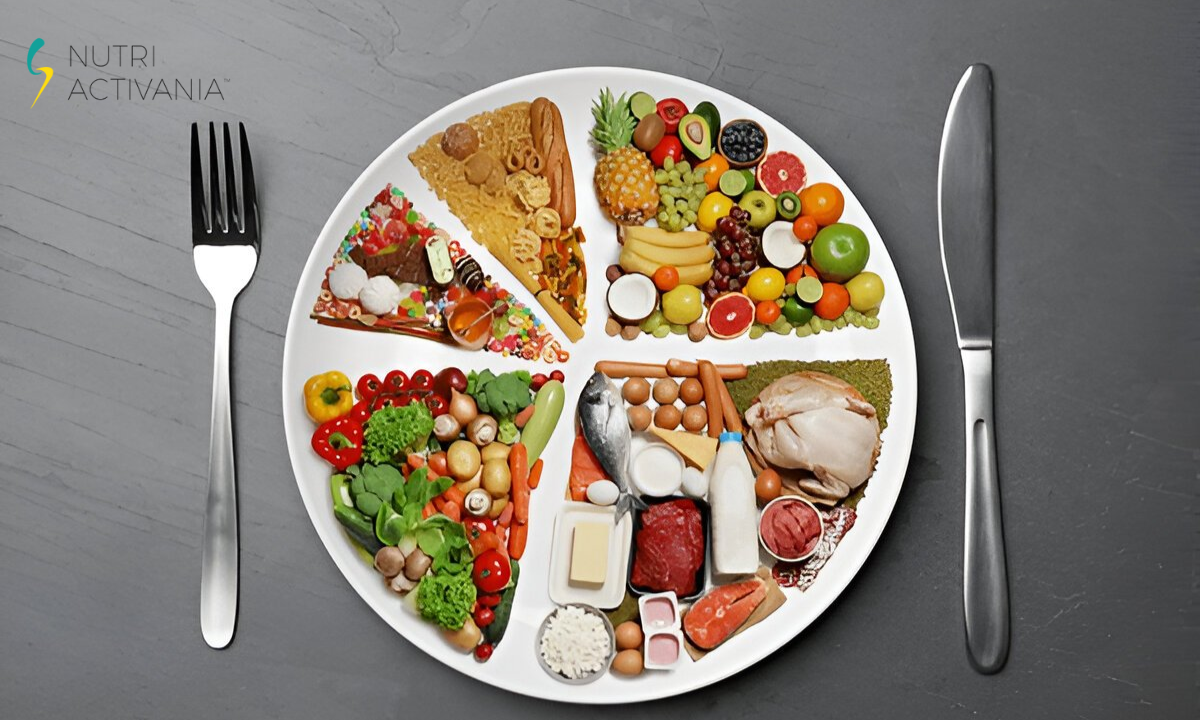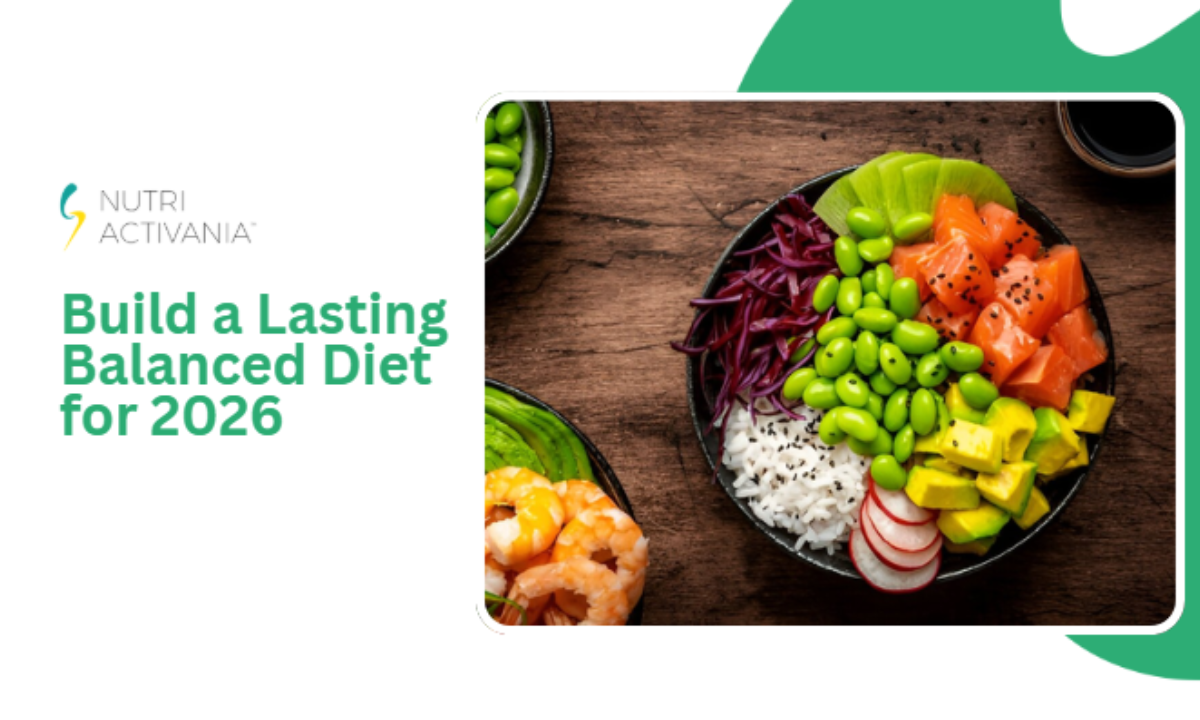A balanced diet is not just about eating less or counting calories; it’s about nourishing your body with the right nutrients in the right amounts.
As we are going to step into 2026, I have noticed more people wanting to create healthy eating habits that actually stick, rather than following crash diets that fail by February.
I’m Avni Kaul, and through my years of experience, I have helped countless individuals understand that sustainable health begins with understanding what your body truly needs.
Working with the best dietitian and top nutritionist in Delhi can transform your relationship with food and help you create lasting changes.
But here’s something most people don’t realize about building a diet that actually lasts, and I will share that insight as we go along.
Balanced Diet Meaning: What Does It Really Mean?

Let me break this down simply.
A balanced diet means consuming a variety of foods in proper proportions to provide your body with essential nutrients, proteins, carbohydrates, fats, vitamins, and minerals.
It’s not about eliminating food groups.
It’s about including everything your body needs in amounts that support your health goals.
Think of it as creating harmony on your plate where no single nutrient dominates or gets ignored.
Balanced Diet Importance: Why Should You Care?
I often tell my clients that their diet is the foundation of everything.
Your energy levels, your mood, your immunity, and even your sleep quality are all connected to what you eat.
The importance of a balanced diet cannot be overstated because it affects every single system in your body.
When you eat right, you are not just preventing diseases. You are actively building a stronger, more resilient version of yourself.
Your body functions like a well-oiled machine when it receives consistent, quality nutrition.
Balanced Diet Benefits: What You Gain
Let me share what I have observed in clients who commit to balanced eating.
Physical Health Benefits:
- Sustained energy throughout the day
- Better weight management
- Stronger immune system
- Improved digestion
Mental Health Benefits:
- Enhanced concentration and focus
- Better mood stability
- Reduced stress and anxiety
- Improved sleep quality
The balanced diet benefits extend far beyond just physical health.
I have seen people’s entire lives transform, with better work performance, improved relationships, and increased confidence.
It all starts with feeding your body properly.
Understanding Balanced Diet Nutrition
Here’s where many people get confused.
Balanced diet nutrition isn’t complicated, but it does require understanding what each nutrient does.
- Proteins: Build and repair tissues, support immune function
- Carbohydrates: Provide energy for daily activities and brain function
- Fats: Support hormone production and nutrient absorption
- Vitamins and Minerals: Regulate body processes and support overall health
- Fiber: Aids digestion and maintains gut health
Each nutrient plays a unique role, and you need all of them.
This is where guidance from me, the best dietitian and top nutritionist in Delhi, becomes invaluable, as I help you understand your specific nutritional needs.
The Balanced Diet Food Pyramid: Your Visual Guide
The balanced diet food pyramid is a simple tool I use to help clients visualize portion sizes.
Here’s how I explain it:
| Level | Food Group | Daily Servings |
|---|---|---|
| Base (Largest) | Whole grains, cereals | 6-8 servings |
| Second Level | Fruits and vegetables | 5-7 servings |
| Third Level | Proteins (dal, eggs, fish, chicken) | 2-3 servings |
| Fourth Level | Dairy products | 2-3 servings |
| Top (Smallest) | Fats, oils, sweets | Use sparingly |
The pyramid shows that foods at the base should make up most of your diet.
As you move up, portions get smaller.
It’s not about restriction, it’s about proportion.
Creating Your Balanced Diet Chart
I always customize a balanced diet chart for each client because everyone’s needs differ.
But here’s a general framework that works for most people:
| Time | Meal | Food Options |
|---|---|---|
| Morning (7–8 AM) | Breakfast | Whole grain toast or paratha, Eggs or paneer, Fresh fruit, Green tea or milk |
| Mid-Morning (11 AM) | Snack | Handful of nuts, Buttermilk, or fruit |
| Lunch (1–2 PM) | Main Meal | Brown rice or roti, Dal or chicken/fish, Vegetable curry, Salad, Curd |
| Evening (4–5 PM) | Snack | Sprouts chaat, Green tea |
| Dinner (7–8 PM) | Dinner | Roti or a small portion of rice, Vegetable or lean protein, Soup or salad |
Remember, this is just a template. Your ideal chart depends on your age, activity level, health conditions, and goals.
Role of a Nutritionist: Why Professional Guidance Matters
Many people ask me if they really need professional help. Here’s my honest answer: you can learn the basics on your own, but the role of a nutritionist goes much deeper.
We don’t just create meal plans.
We analyze your medical history, understand your lifestyle, identify deficiencies, and create sustainable strategies.
Help you navigate the overwhelming amount of nutrition information online.
We adjust your plan as your body and goals change.
Most importantly, we provide accountability and support when motivation dips.
That’s the real value of working with professionals.
Making Your Diet Last Beyond January
Here’s the secret I promised earlier: sustainable diets aren’t built on willpower. They’re built on habits that fit naturally into your life.
I don’t ask clients to overhaul everything overnight. We make small, manageable changes that compound over time.
Maybe we can start by adding one more vegetable to lunch. Then we work on hydration. Then we adjust breakfast timing.
Each small win builds confidence and creates momentum. This approach works because it doesn’t feel like deprivation. It feels like progress.
Practical Tips for 2026
- Prep vegetables on weekends so cooking becomes faster during busy weekdays.
- Keep healthy snacks visible and junk food out of sight.
- Eat mindfully, put your phone away, and actually taste your food.
- Stay hydrated; sometimes thirst masquerades as hunger.
- Don’t skip meals; it leads to overeating later.
These simple strategies make balanced eating much easier.
Common Mistakes to Avoid
I see these mistakes repeatedly:
- Eliminating entire food groups unnecessarily.
- Following fad diets that promise quick results.
- Comparing your journey to someone else’s.
- Being too rigid, one “unhealthy” meal doesn’t ruin everything.
- Not seeking help when you feel stuck or confused.
Learn from these common pitfalls before they derail your progress.
Wrapping Up
Building a balanced diet that lasts requires patience, understanding, and often, professional guidance.
As we embrace 2026, focus on creating eating patterns that nourish your body and fit your lifestyle.
Remember, this isn’t about perfection; it’s about consistent, mindful choices that support your long-term health.
At Nutri Activania, I believe in empowering you with knowledge and personalized strategies that work for your unique needs.
If you are ready to make this the year of lasting change, consider consulting me, Avni Kaul, the best dietitian and top nutritionist in Delhi. I can guide you on this journey.
Your future self will thank you for the investment you make in your health today.
Frequently Asked Questions
Q1: How long does it take to see results from a balanced diet?
Most people notice improved energy and digestion within 2-3 weeks. Visible physical changes typically appear after 6-8 weeks of consistent healthy eating.
Q2: Can I eat sweets on a balanced diet?
Absolutely! Balance means including all foods in moderation. An occasional sweet treat won’t derail your progress; it’s about overall patterns, not individual meals.
Q3: Is a balanced diet expensive?
Not at all. Focus on seasonal vegetables, local fruits, and basic proteins like dal and eggs. These are affordable and nutritious options available to everyone.
Q4: Do I need supplements with a balanced diet?
Most people get adequate nutrients from a well-planned diet. However, specific deficiencies may require supplementation; consult a nutritionist for personalized advice.
Q5: How do I handle social events and eating out?
Plan by eating a healthy snack before events. Choose grilled or steamed options when eating out. Remember, one meal won’t undo your progress. Enjoy yourself mindfully.


